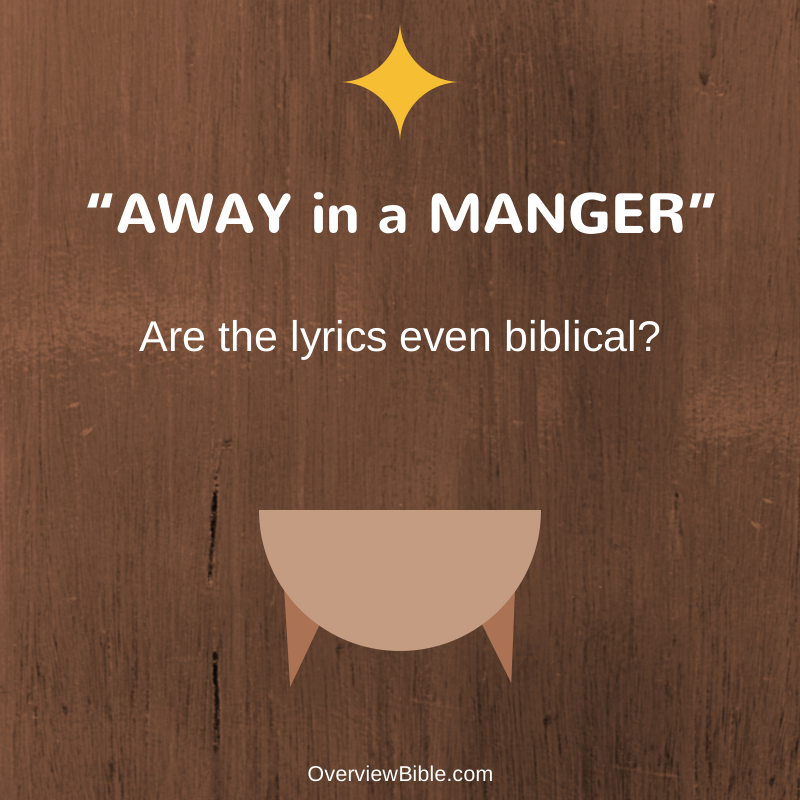If you grew up in the church, this may have been the first song you ever sang in public. It’s “Away in a Manger,” that Christmastime lullaby.
I’ve been nit-picking my way through Christmas hymns like “O Holy Night” and “Joy to the World“—both of which have been pretty Bible-based.
Now let’s see how “Away in a Manger” lines up. Note: legends aside, this song was probably not written by Martin Luther.
Away in a Manger: are the lyrics biblical?
Away in a manger, no crib for a bed,
The little Lord Jesus laid down His sweet head.
Obviously, this one’s biblical. Luke makes it pretty clear that Jesus was lying in a manger (Lk 2:7, 12).
The stars in the bright sky looked down where He lay,
The little Lord Jesus asleep on the hay.
A lot of Christmas carol lyrics insist that the starlight was especially brilliant when Jesus was born (including “O Holy Night“), but the Bible is silent on that matter. It’s no big deal, of course.
The cattle are lowing, the baby awakes,
But little Lord Jesus, no crying He makes.
We don’t know for sure that cattle (or any animals) were present at the manger scene. We tend to assume that they were—it’s a manger scene, after all—but once again, Scripture doesn’t say.
Jesus was sin-free, but He was also human (He 4:15). There’s a false teaching in church history called docetism: the belief that Jesus wasn’t really human; instead, He was a phantom that only looked like a man. “Away in a Manger” lyrics aren’t overtly docetic, but asserting that a newborn human doesn’t cry is a stretch. And of course, the Bible is silent on the baby Jesus’ silence.
I love Thee, Lord Jesus, look down from the sky
And stay by my cradle till morning is nigh.
Jesus is, in fact, seated at the right hand of God in heaven (Mk 16:19; Col 3:1; He 1:3). So is it wrong to ask for Him to be present through the night? I don’t think so, considering His promise to be with His disciples always (Mt 28:20).
Aside: by the time I hear any children singing that last line, they’re way too old to be sleeping in a cradle.
Be near me, Lord Jesus, I ask Thee to stay
Close by me forever, and love me, I pray.
If the singer is saved, the response is, “Done and done.” Jesus is not only nearby; He is within us (Rom 8:10; Col 1:27). And Jesus has already demonstrated His great love for us:
“Just as the Father has loved Me, I have also loved you; abide in My love.” —Jesus, Jn 15:9
“But in all these things we overwhelmingly conquer through Him who loved us.” —Paul, Ro 8:37
“I live by faith in the Son of God, who loved me and gave Himself up for me.” —Paul, Ga 2:20
“Walk in love, just as Christ also loved you and gave Himself up for us . . .” —Paul, Eph 5:2
“To Him who loves us and released us from our sins by His blood [. . .] to Him be the glory and the dominion forever and ever. Amen.” —John, Re 1:5–6.
Bless all the dear children in thy tender care,
And take us to heaven, to live with Thee there.
The “bless all the dear children” line could have a few meanings. It could imply that all children are heaven-bound (something the Bible doesn’t directly claim). It could also be a plea to bless all the children of God (1 Jn 3:1) with care from Jesus. In the case of the latter, we can know that God does indeed care for us (1 Pet 5:7).
The discussion of what it means to be taken to heaven is probably beyond this blog post’s scope. Paul seems to believe dying and joining Christ in heaven is good (Php 1:21–23), but it’s not permanent. One day, God will recreate the heavens and the earth, and dwell among men in the New Jerusalem (Rev 21:3). Come quickly, Lord Jesus!
Away in a Manger: fluffy
It seems that lyrics to these kinds of songs fall into one of three buckets: statements consistent with the Bible, statements that contradict the Bible, and fluff. “Away in a Manger” has a lot of fluff, but as we’ve seen, there’s only one line that borderlines a counterbiblical claim.
I don’t think all fluff is bad. Fluff can be poetic. Fluff can set a tone. And if you hate the word “fluff,” I’m open to using another word for nonbiblical content.
In this song’s case, the singer ends up describing a manger scene which may or may not be accurate, and then asking Jesus to do what He has already done (“be near me,” “love me”). Not a huge deal, but it’ll keep me from enjoying “Away in a Manger” as much as I enjoy theologically richer songs.
I’d like to go through several more Christmas hymns before your Christmas Eve services. Any ideas? Leave me a suggestion in the comments.





We know for sure that there was a donkey in the stable. Mary rode a donkey into Bethlehem.
How do we know she rode a donkey? ;-)
I’ve always understood this song to be a snapshot of the manger scene, so that it’s not claiming that Jesus never cried. It’s giving an image of this one time that Jesus didn’t cry. Since it’s just as impossible to say that there was NEVER a time when a fully-human baby Jesus woke up without crying, I think we can safely consider those lyrics at worst apocryphal, but not heretical.
What mystifies me more is the sudden jump in the middle of verse two from Jesus as baby to Jesus as lord. In verse 2 line 2, he’s a baby in a manger, and in the very next line he’s seated next to God in heaven and I’M now a baby! What?? :D
Once in royal David’s city